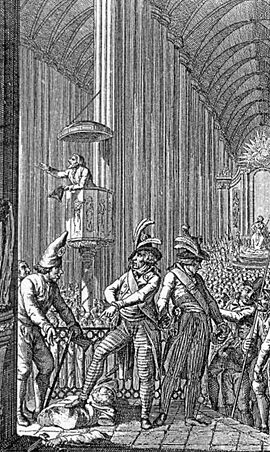The irrational worship of reason
 If you like state-created religions, you have reason to celebrate on November 10. Or rather Reason. Because it was on this date in 1793 that the French Revolutionary government tried to impose the Goddess of Reason on its populace, a violent wrenching of spiritual impulses out of their normal course that can only end horribly.
If you like state-created religions, you have reason to celebrate on November 10. Or rather Reason. Because it was on this date in 1793 that the French Revolutionary government tried to impose the Goddess of Reason on its populace, a violent wrenching of spiritual impulses out of their normal course that can only end horribly.
Well, not Goddess exactly. They had Goddesses of Reason in their November 10 Fête de la Raison, but to avoid idolatry they used attractive women. Which isn’t necessarily a direct appeal to reason to begin with and reminds us that Madison Avenue did not invent the “Here’s a pretty girl so buy our toothpaste” approach to public relations.
Evidently the Goddess of Reason in the initial Paris festival was played by the wife of Antoine-François Momoro, the guy who coined the phrase “Liberté, Égalité, Fraternité ou la mort” of which the last part is often forgotten though not by its most enthusiastic practitioners. She evidently dressed “provocatively” and according to Thomas Carlisle “made one of the best Goddesses of Reason; though her teeth were a little defective”.
Now bad teeth fall a little short of Olympus. But technically the Cult of Reason was in any case atheistic. Or worse. In fact the Cult of Reason worshiped a supposedly divine being. But that being was man.
Well, not man exactly. Not man as he was, grubby, superstitious, prone to emotions and infuriating to self-appointed elites through history. Man as he would be if perfected by achieving Truth and Liberty through Reason. Or, if he proved recalcitrant, by removing his head with its troublesome brain.
It is ironic that a government would seek to impose rationality through coercion given that if the whole thing were even remotely reasonable, it ought to have proceeded successfully by persuasion. And it is also ironic that worshiping man is not reasonable if you have anything resembling powers of observation, nor is supposing that man is secretly something utterly different and far better than he is.
Nor even more fundamentally is thinking that pure reason can sustain anything resembling a desire to live or to act. Almost all the greatest minds who have considered the matter, a category that excludes virtually every French Revolutionary I might add, have concluded that there is something we are made for, something inherent in the nature of man, toward which can guide us but is not itself reason and is somehow more primordial. Mr. Spock would have had no logical reason to get out of bed and behave with benign honour all day.
Undeterred by such reasoning, or influenced by reasoning of any kind at all, French radicals proceeded to desecrate churches including dismantling the altar at Notre Dame in Paris and replacing it with an altar to Liberty and carving “To Philosophy” over the doors, and insisting that all cemetery gates should read only “Death is an eternal sleep”. Which is, again, not something a great many very rational people ever believed, let alone felt should be stuffed down people’s throats rather than poured into their ears. Nor are altars or cathedrals “reasonable” if you are insisting there is no deity.
It gets worse. The system soon found its own actual god, in the form of “le peuple”. So the ultimate irony is that a system that began by worshipping man ended by sacrificing him bloodily to a collective “man” that was a Moloch devouring individuals in defiance of Truth, Liberty or Reason.
You know it’s bad when Robespierre steps into rein in your excesses, which he did on May 7 1794 with his Cult of the Supreme Being, a kind of decaffeinated religion with an actual God who’s just this kind of mist that never bothers or judges you. But even Robespierre realized that without a lawgiver there can be no law, in the moral as in the political sphere. So the Cult of Reason was out-reasoned by Robespierre barely two months before the guillotine perfected him on July 28 of that same year.
The French Revolution featured noble sentiments shouted from the rooftops and rivers of blood pouring down the sewer. Exactly the sort of situation Montaigne described with his aphorism “Between ourselves, there are two things that I have always observed to be in singular accord: supercelestial thoughts and subterranean conduct.”
When man begins by worshiping himself he infallibly ends by slaughtering himself, the collectivity elevated then immolated in a blazing pyre of unreason whose fuel is reason itself cut off, dried out and set ablaze by passions rendered uncontrollable precisely by denying their existence.